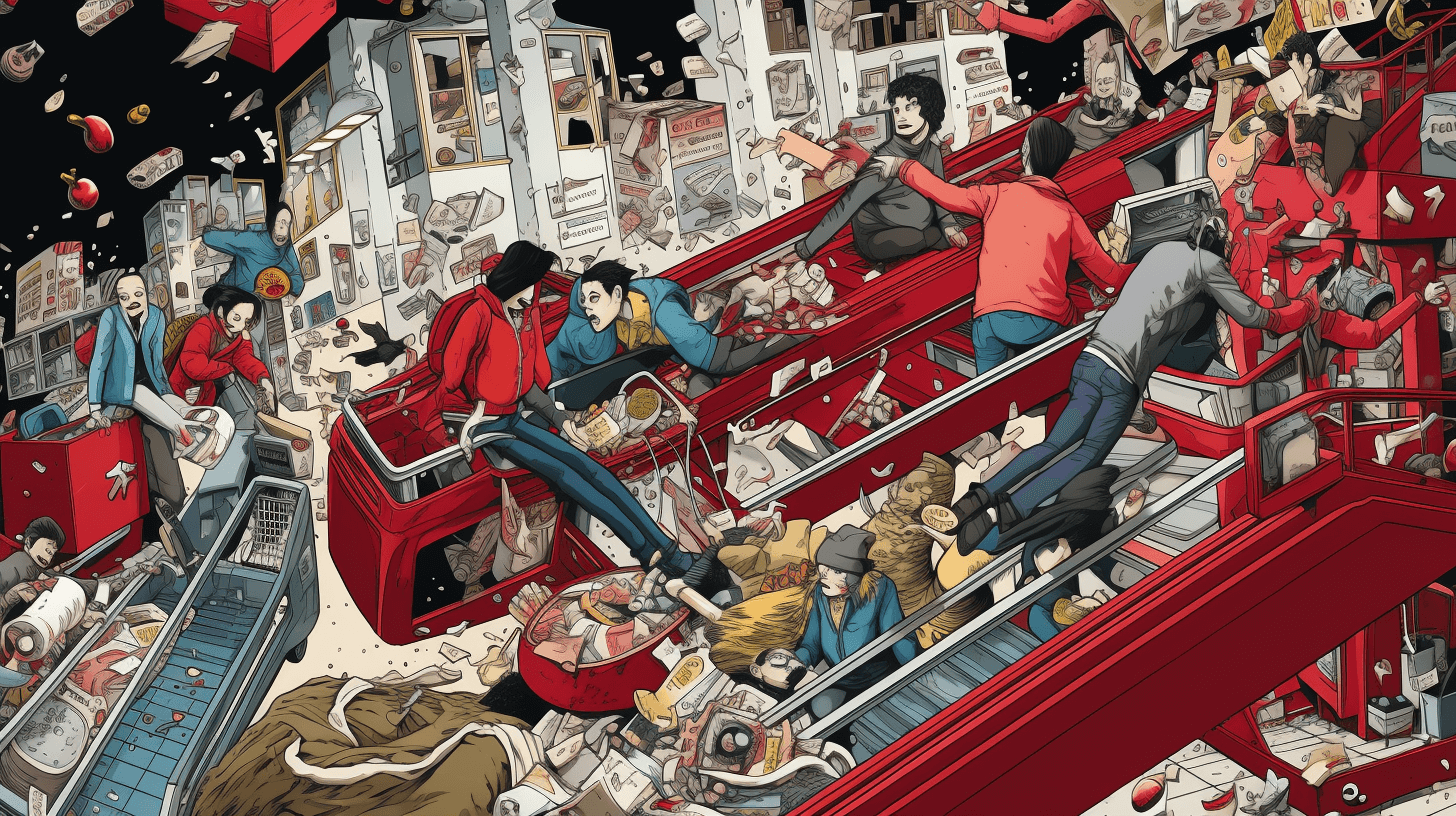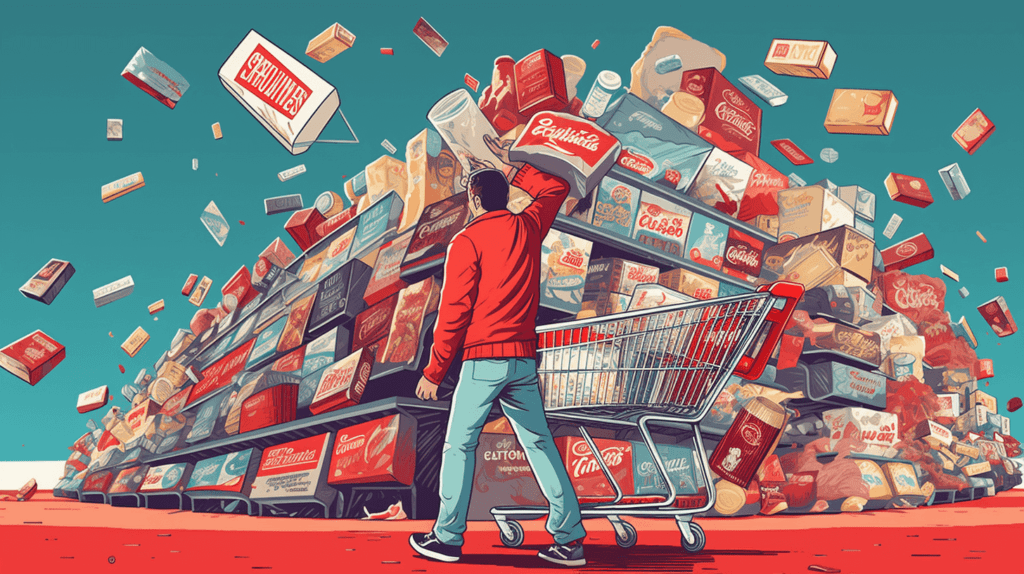Truth & Goodness
Poison on a Plate: What Drives Us to Eat Dangerously?
01 March 2026

“Faster, higher, stronger” (from the Latin citius, altius, fortius), the Olympic motto, symbolizes man’s eternal aspiration to continuous development, exploration and reaching for the distant. Sometimes too much courage in discovering mysteries was considered pride and a destruction of the divine order of things (see Galileo). Despite this, the Industrial Revolution, and now the ongoing technological one, have caused us to realize ambitious goals as a civilization and to achieve more and more. In addition to satisfying ordinary human curiosity, the act of discovery gives us measurable benefits. We live in a world of prosperity, but also huge contrasts. And as Westerners, we have more and more wealth and less and less of ourselves.
In the world presently, with a population of nearly 8 billion people, the sum of the GDP of all countries, that is, the value of “global wealth,” is US$96.51 trillion (2021). This entails that for every inhabitant of the Earth, there is a fortune worth US$12 million. It is a sum that can exceed the possibilities of imagination. Analyzing data since 1960, 15 years after World War II, when the economic situation on our globe stabilized, we can note that we are constantly becoming richer. However, international organizations have long warned that we live in a world of disproportions. Rich North, poor South; capitalism of the West and the planned economy of the East. Being born in the right place on the planet should guarantee us a happy, prosperous life. But does it really?
The citizens of European countries which benefited from the Marshall Plan after World War II have not known what scarcity is for several decades. The ambitions of other, so-called developing countries, mean that they will soon “catch up” with these model and highly developed countries. Referring to Maslow’s pyramid: when a person has at one’s fingertips everything one needs to satisfy basic needs, they can focus on self-realization, the search for acceptance and love. We do not fight for being and “staying afloat,” so we activate ambition, we engage our resources in career development, education, and self-improvement. Sometimes we get caught up in a race that, instead of allowing us to gain further levels of happiness, does not guarantee it at all, and even may cause real suffering.

A 2021 Wellcome Global Monitor study found that the countries with the highest income have, at the same time, the highest rates of people aged 13 to 19 who experience an episode of anxiety and depression. It would seem that the young generation, which no longer remembers wars, economic problems and deprivation, should develop in full harmony. The statistics on the prevalence of anxiety disorders are equally worrying. This type of condition is present in: 5.7% of Americans, 6.7% of Norwegians, 6.3% of the French and 6.9% of Germans. Meanwhile, in societies of countries considered poor, it is 3.4% of Somalis, similarly for Kenyans, and 2.9% among Senegalese. At first glance, one could say that the level of well-being positively correlates with the number of people suffering from anxiety disorders. Of course, this is only a superficial conclusion. But let’s ask ourselves: What are we afraid of?
Anxiety is a state of the body that is subjectively felt as tension and concern. It is often confused with fear, but it is not, as fear is an adaptive response of the body and informs us that we should withdraw from a threatening situation. After eliminating the stimulus, we achieve balance, whereas in the case of anxiety, it is difficult, because it is usually not caused by a specific “thing” as such.
The ICD-10 International Classification of Diseases distinguishes, among others, generalized anxiety disorder. GAD is a disease that is characterized by a continuous, uninterrupted feeling of free-floating anxiety. The patient feels stimulation from the autonomic nervous system, as well as circulatory and digestive systems. It usually finds an outlet, depending on the cultural context, in worrying about everyday matters: work, school, property or family. However, solving problems that are subjectively considered a source of suffering does not bring relief.
The psychological causes of this disease can be seen in the types of attachment to caregivers. The anxious-avoidant and ambivalent style developed in early childhood entails the occurrence of the disorder. Cognitive-behavioral theory assumes that GAD is associated with dysfunctional patterns of response to threats, while psychodynamic theory considers unresolved, unconscious conflicts that cause tension felt as anxiety as the source.
Some people struggle with the disease throughout their lives. The prevalence among adolescents is alarming and raises the important conclusion of whether material goods do not obscure the higher values, whose hunger we feel more and more acutely.
“It’s a little lonely in the desert…” “It is lonely when you’re among people, too,” the snake answered to The Little Prince. This is the truth and, unfortunately, the sad reality of many people. When we hear reports of another suicide, we all ask ourselves: Why? What was going on in his or her head? Why didn’t they ask anyone for help? However, these are questions asked too late.
Parents trying at all costs to provide for their children forget about conversation, building bonds, trust and relationships. They work a lot, they have a lot, but still not enough.
In an “instant” world, we limit ourselves to short messages and brief answers. We do not notice body language, the subtleties of facial expressions, or empty eyes that once shone. In relationships, we distance ourselves from each other, lighting our faces with smartphones, not so that someone can see us better, but to turn off our brains, free ourselves from galloping thoughts, and fill the cognitive sphere with news headlines and photos of “friends.” At some point, we realize that we don’t know our children. Our parents, to whom we wanted to say so much, but there was no time, are leaving. Or rather there was time, but we just didn’t have a moment to deal with our fears and let ourselves finally forgive them.
In South Korea, a phenomenon called “mukbang” is developing. This is another way to make money by monetizing your content on social media. It involves the transmission of consuming sumptuous, multi-course meals. Some media applaud, shouting: “foodporn!” But isn’t that the expression of the poignant emptiness of man? Meals in almost every known culture have always been eaten with others. A table shared with family, friends, and partners, is replaced here by an anonymous man, whom we see on a computer screen – necessity is the mother of invention. After all, in South Korea, young people work an average of 69 hours a week. It is hard to find time to eat a meal together, if one has someone to share it with at all.
A social networking site. A photo of a woman, about 50 years old. Dressed very tastefully. Mature, elegant and beautiful. Relationship status: “single.” She was left alone after 30 years of marriage. A man, 30 years old. Handsome, well built. A note under the picture: “I’m not looking for anyone. I’m tired of failure.” Woman, 25 years old. In the picture smiling, accompanied by her beloved dog. As a description, the motto: “A woman will forgive you everything except for one thing: That you don’t love her.” These self-presentations are a cry for love. For there to be someone who will ask: “Have you eaten anything today?” “How do you feel?” or will say: “Dress warmly.”
Sometimes it seems to us that money can buy anything. In England, after 10 years of living together, more than 20% of marriages break up. Similarly in the United States. Looking at the expensive, representative streets of big cities, it is impossible to resist the impression that exclusive clothes or perfumes are supposed to compensate for it. The constant exchange of goods makes us also treat love as a transaction. Something for something.
From the glass-building offices, we return to a beautiful home in our expensive car. A sentence that contains everything that people who live watching the “world of the rich” on television would like to have. They don’t know, however, that this is all, it’s not happiness. Or maybe when we struggle with everyday hardships and sometimes deprivation, that’s when we stick together? Perhaps it’s the lack of that rush that allows us to find time to be human. And by allowing ourselves to do what is human, maybe it is easier for us to love.
Read more on Holistic News

Truth & Goodness
01 March 2026


Zmień tryb na ciemny